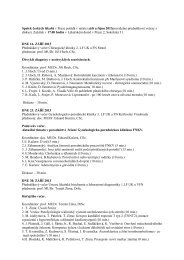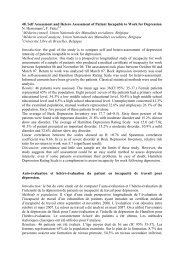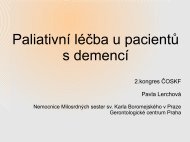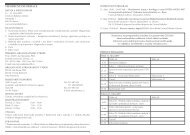ABSTRACTS â ORAL PRESENTATIONS - AMCA, spol. s r.o.
ABSTRACTS â ORAL PRESENTATIONS - AMCA, spol. s r.o.
ABSTRACTS â ORAL PRESENTATIONS - AMCA, spol. s r.o.
You also want an ePaper? Increase the reach of your titles
YUMPU automatically turns print PDFs into web optimized ePapers that Google loves.
P34. PHARMACOLOGICAL INHIBITION OF SKP2-SCF COMPLEX ACTIVITY AS AN<br />
APPROACH TO MODULATE CHARACTERISTICS OF CANCER STEM CELLS<br />
Šárka Šimečková 1,2* , Zuzana Pernicová 1,3 , Radek Fedr 1 , Alois Kozubík 1,2 , Karel Souček 1,3*<br />
1<br />
Department of Cytokinetics, Institute of Biophysics, Academy of Sciences of the Czech<br />
Republic, Brno, Czech Republic;<br />
2<br />
Department of Experimental Biology, Faculty of Science, Masaryk University, Brno,<br />
Czech Republic;<br />
3<br />
Center of Biomolecular and Cellular Engineering, International Clinical Research Center,<br />
St. Anne´s University Hospital Brno, Brno, Czech Republic<br />
*correspondence to: simeckova@ibp.cz, ksoucek@ibp.cz<br />
The cancer stem cells (CSCs) represent an attractive target for anticancer therapy. These<br />
cells are responsible for tumor relapse and serve as a reservoir of cancer cells within<br />
tumors. There are some characteristics of CSCs, which they share with their normal<br />
counterparts, as for example asymmetric division, differentiation into heterogeneous cell<br />
populations, and slow cycling. These cells have also an ability to invade into a surrounding<br />
tissue and importantly, they are more resistant to conventional drug treatment.<br />
Skp2 protein is a crucial component of Skp2-SCF complex that functions as an E3<br />
ubiquitin ligase involved in protein degradation. Skp2 is essential for cell cycle regulation<br />
via degradation of p27 Kip1 , Cdt1 and other molecules. High level of Skp2 was described<br />
in various types of cancer, including prostate and colorectal cancer. Pharmacological<br />
inhibition of Skp2-SCF complex has strong potential in anticancer therapy. Binding NEDD8<br />
to Cullins is necessary for Skp2-SCF formation and activity (Kawakami et al., 2001).<br />
Recently, a novel inhibitor of NEDD8 pathway MLN-4924 was described (Soucy et al.,<br />
2009). Disruption in NEDD8 pathway using this inhibitor leads to accumulation of Skp2<br />
substrates and triggers cellular processes such as cell cycle arrest, cellular senescence<br />
and apoptosis.<br />
In this work we used MLN-4924 inhibitor and investigated its effect on murine<br />
adenocarcinoma cell line cE2 and human colorectal carcinoma cell line HCT116.<br />
Accumulation of Skp2-SCF substrates after MLN-4924 treatment led to deregulation of<br />
cell cycle in both cell lines. Interestingly, both cell lines express surface markers CD133<br />
and CD44 typical for CSCs and can be divided into two subpopulations based on the<br />
expression of CD133 – CD44 + CD133 low and CD44 + CD133 high (Fedr et al., 2013). Therefore,<br />
we further investigated the effect of MLN-4924 inhibitor on these subpopulations. MLN-<br />
4924 reduced clonogenic capacity of single cells in both cell lines and downregulated<br />
surface expression of CD133. Next, using flow cytometry we introduced a multicolor<br />
multiparametric protocol for simultaneous assessment of expression of surface CSCs<br />
markers, DNA synthesis, viability, cell cycle, apoptosis, and DNA damage. Using HCT116<br />
cells, we show that CD44 + CD133 low and CD44 + CD133 high subpopulations significantly<br />
differ in their response to treatment with MLN-4924 inhibitor. Higher sensitivity to DNA<br />
damage induction and arrest in G1 phase of the cells cycle was found in CD44 + CD133 low<br />
subpopulation, whereas CD44 + CD133 high subpopulation arrested preferentially in S phase<br />
and DNA damage was not observed.<br />
128 Analytical Cytometry VII








